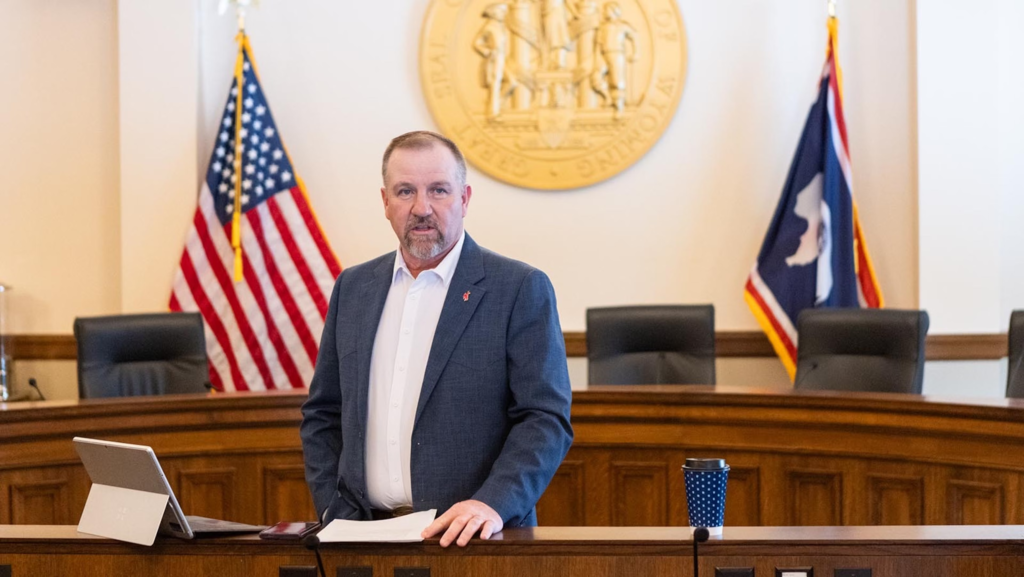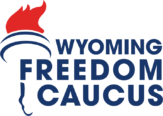
Leo Wolfson– Cowboy State Daily
Wyoming Freedom Caucus Chairman Rachel Rodriguez-Williams, R-Cody, speaks during a Freedom Caucus press conference at the Wyoming Capitol in Cheyenne on Friday, March 7, 2025. (Matt Idler for Cowboy State Daily)
CHEYENNE — As far as the Wyoming Freedom Caucus is concerned, the 2025 legislative session was a success for the group of conservative legislators, their first holding a majority in the state House.
State Rep. Rachel Rodriguez-Williams, R-Cody, chairman of the Freedom Caucus, said during a lengthy Friday press conference at the state Capitol that holding more power makes the group a target.
She said she expects the Freedom Caucus to continue “to be attacked by biased media outlets in this state, the good old boys club and the deep state insiders.”
The Freedom Caucus has promoted its growth as having a better connection with voters than previous lawmakers who had a somewhat more moderate voting streak.
“The Wyoming Freedom Caucus-led House of Representatives is breaking down the establishment stranglehold on state government,” she said. “Just like President Trump is bringing common sense change to Washington, the Wyoming Freedom Caucus is bringing common sense change to Cheyenne.”
The group highlighted more than a dozen bills it got across the finish line and to the governor’s desk that they believe address election integrity, immigration, banning “the woke agenda” and “woke investment strategies,” and cutting taxes.
The caucus did get a fair amount of bills passed by the Legislature and achieved most, if not all, of its “Five and Dime” platform.
But the group also didn’t come anywhere near a clean sweep, and missed on some of its more far-reaching measures like banning ballot drop boxes and electronic voting machines.
There’s also no guarantee Gordon will sign any of the bills on his desk into law.
Rep. Landon Brown, R-Cheyenne, one of the most vocal critics of the Freedom Caucus, said the group did a “decent job” of getting its bills passed in spite of other shortcomings he saw, giving them a C to C+ grade overall.
“They did a decent job,” he said. “They did eliminate DEI (diversity equity and inclusion) and made large property tax cuts, but at what cost? They can pound their chests, but they also cut out funding for local governments and knocked the legs out from them with a 25% (property) tax cut.”
Although Brown is correct that the Freedom Caucus supported the 25% tax cut, the group also fought to get backfill money in to help local services that ended up being rejected by the Senate.
Brown said that when considering the Freedom Caucus had a majority in the House, it was hardly an achievement that it was able to get bills passed in that chamber.
Rodriguez-Williams and House Speaker Chip Neiman, R-Hulett, also believe the Freedom Caucus proved the naysayers wrong in that they were able to maintain a productive chamber and govern effectively.
“We deliver, we can govern, and we’ve been a voice for the people of Wyoming,” Rodriguez-Williams said.
Sen. Ogden Driskill, R-Devils Tower, said the Freedom Caucus actually exceeded his expectations and he doesn’t think “they did a horrible job,” but didn’t like what he saw as its fixation with national issues.
“This will go down as the session where we did absolutely nothing but national issues,” he said.

Wyoming House Speaker Chip Neiman, R-Hulett, speaks during a Freedom Caucus press conference at the Wyoming Capitol in Cheyenne on Friday, March 7, 2025. (Matt Idler for Cowboy State Daily)
Grading The Speaker
Neiman refused to grade his own performance during Friday’s press conference, but said he did “pretty good” and stood by his work that involved more than 210 hours of working on bills, the equivalent of nearly nine days.
“It’s not about what I can do, it’s about what we can do as a body, and that’s what I’ve always wanted to focus on,” Neiman said. “The body has made it easy to be Speaker and to be able to accomplish things for the state of Wyoming.”
Neiman and others said one of the biggest differences they saw in this year’s session was that many bills that never had a chance in the past were given serious consideration this year.
“The change in leadership has changed so many things,” Neiman said, adding that a list of bills the caucus highlighted as passing Friday would not have been possible without the voters. “Conservative works better than liberal. It’s just a fact, and Wyomingites understand that, they said that and we responded.”
Neiman also mentioned a few bills Friday that were sponsored by non-caucus members like Reps. Art Washut, R-Casper, and Trey Sherwood, D-Laramie, as being a positive for Wyoming.
Driskill was frustrated by how many committee bills were killed in the House, but members of the Freedom Caucus stressed Friday they were simply acting on the will of the people.
Brown said Neiman did a good job as speaker and believes he made a legitimate effort to promote unity within the House body, although he said lacked control over the House and knowledge of the rules. Other members of the caucus, he said, not so much.
What he found telling, Brown said, was that the same amendments rejected by Freedom Caucus members in the House were then added to the same bills in the Senate, and later lauded by Freedom Caucus members as the Senate making “a good catch.”
“It’s pure stupidity at that point,” he said.
Neiman and Rodriguez-Williams mentioned the caucus holding firm and overriding a number of the governor’s vetoes, which Neiman believes proves an effective form of governance.
As far as his personal relationship with the governor, Neiman took the high road and said he looks forward to working with him in the future. The governor has taken a dim view of the Freedom Caucus in many public statements over the years, indirectly referring to the group in one of his veto letters this year as a “wild bunch.”
“I look forward to working with the governor. I work with people that are wrong every day on some of these issues,” Neiman said, “and I’m sure he feels exactly the same way about me.”
Reps. Scott Heiner, R-Green River, and Chris Knapp, R-Gillette, both said the Freedom Caucus has a desire to shift its focus from politics to policy.
Driskill said he has a much better working relationship with individual Freedom Caucus members than the group as a whole. His main frustration with the Freedom Caucus is what he sees as its constant preparation for the next election.
“Everything they do is about making smears and trying to create traps for the next election,” he said.

State Rep. Scott Heiner, R-Green River, speaks during a Freedom Caucus press conference at the Wyoming Capitol in Cheyenne on Friday, March 7, 2025. (Matt Idler for Cowboy State Daily)
Fossil Fuels Support
One of the Freedom Caucus’ proudest achievements from the 2025 session is a bill that’s received minimal media attention.
During the press conference, multiple members of the caucus bemoaned the lack of media coverage of Senate Enrolled Act 3, a bill Gordon signed into law that ensures Wyoming’s small oil and natural gas operators can continue to produce energy despite federal regulations.
Previously, an oil well had to have about $25,000 in bond for reclamation. Former President Joe Biden’s administration upped that to $500,000 per well, a price that had to be paid by June of the next year.
Heiner said about 70% of the oil wells in Wyoming are small and aging, producing around 10-20 barrels a day with a gross revenue of about $25,000-$35,000 per year.
“To be able to come up with a $500,000 bond was insurmountable for our small producers,” Heiner said.
The effect of the Biden mandate, he said, is that producers would end up plugging their wells because they couldn’t afford to pay the bonds, which he estimated would cause as much as a 15% hit to Wyoming state revenue and put 10,000 people out of work.
The bill creates a pool for small producers to pay into that is the drawn from to help pay the bonding expenses for plugging dry or abandoned wells, for reclamation requirements, and for the forfeiture of any applicable bond by creating a self-sustaining safety net that protects the oil and gas industry.
“This is the first system like this anywhere in the nation, anywhere in the world,” said Petroleum Association of Wyoming Board Member Tom Van Kleef said in a statement last month.
Heiner also mentioned how the Legislature reduced the coal severance tax rate from 6.5% to 6% as an effort to support the industry after it already lowered it from 7% a few years ago.
Senate Enrolled Act 50 clarifies that a sales tax exemption for the sale of power or fuel in Wyoming applies regardless of who owns the tangible personal property that is being transported, which Heiner said will also benefit small energy producers.
Senate Enrolled Act 19 exempts the first $75,000 fair market value of business property from taxes in Wyoming starting in 2026. Senate Enrolled Act 8 gives businesses more relief on the taxation of their older equipment.
Senate Enrolled Act 59, similar to federal legislation U.S. Rep. Harriet Hageman has sponsored called the REINS Act, creates more legislative oversight over state agency rules and allows the Legislature to eliminate rules that get created. Similarly, the ability of the federal government to make rules was severely curtailed in 2024 with the overturn of the Chevron doctrine.
Leo Wolfson can be reached at [email protected].
